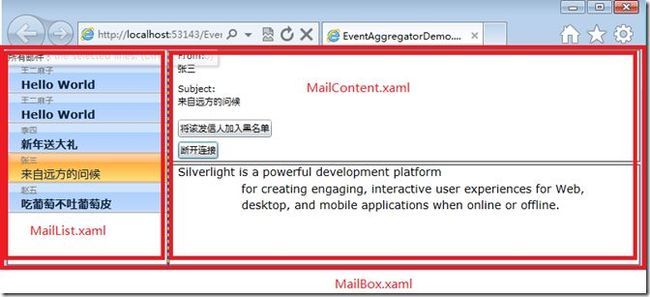Prism之使用EventAggregation进行模块间通信
http://www.cnblogs.com/li-xiao/archive/2011/04/20/2022962.html
在开发Silverlight程序的时候,经常需要在不同的组件间进行通信。比如点击一个button,可能就需要改变另一个控件的内容。比较直接的办法是使用事件,当然使用MVVM的时候也可以使用command,还可以定义一些全局的变量来保存一些信息等。
Prism提供了几种用于组件间通信的途径,可以使用RegionContext使不同的视图共享数据,也可以借助于容器的力量来使用共享的service来进行通信,或者使用command等。除此之外,Prism还提供了一种基于事件的多播发布/订阅方式的通信机制,使不同的组件之间能够以一种松散耦合的方式来进行通信。这就是本文要介绍的事件聚合(Event Aggregation)。
事件聚合的过程有点像收听广播,首先要有个固定的频率,然后内容就会在这个频率上广播出去,至于有没有人收听,广播电台是不知道的,它只是把内容播送了出去。而其他的人想听广播也不用跑到广播电台,只要知道频率,收听这个频率就可以了。联系广播电台和听众的就是这个频率。
在事件聚合的过程中,事件发布方(publisher)相当于广播电台,事件接收方(Subscriber)相当于听众,而事件自然就相当于频率了。
使用Event Aggregation很简单,只需要知道一个接口和一个类基本上就足够了。接口是IEventAggregator,类是CompositePresentationEvent。
要想发布或订阅事件,自然得先要有事件,所以第一件工作就是要定义事件。Prism提供了一个事件基类CompositePresentationEvent<TPayload>,自定义的事件只需要继承这个类就可以了,泛型代表的是事件发生过程中需要传递的参数类型。如:
public class ReceiveNewEmailEvent : CompositePresentationEvent<MailViewModel>
{
}
上面定义了一个事件,用于在收到新邮件时使用,传递的参数是一个邮件的ViewModel。
使用的时候也很简单,使用IEventAggregator接口中的GetEvent<TEventType>方法来获取事件,然后要么发布出去,要么订阅一下就可以了。
下面是当收到一封新的邮件的时候,发布事件的代码:
public class EmailReceiver
{
private IEventAggregator _eventAggregator;
public EmailReceiver(IEventAggregator eventAggregator)
{
_eventAggregator = eventAggregator;
}
public void ReceiveEmail()
{
if (_email != null)
{ // 当接收到新邮件时,就发布事件,所有订阅了该事件的组件都会接到通知
_eventAggregator.GetEvent<ReceiveNewEmailEvent>()
.Publish(_email);
}
}
}
可以看到我们直接在构造函数中传递了IEventAggregator类型的参数,如果使用Prism来搭建Silverlight程序的话,那么在默认的Bootstrapper中会在容器中添加IEventAggregator的实例,所以并不需要我们做其它更多的工作。如果对Prism或Bootstrapper不太了解的话,可以参考这两篇文章(Prism简介,Bootstrapper)。
下面是订阅ReceiveNewEmail事件的代码:
public class MailBox
{
public MailBox(IEventAggregator eventAggregator)
{
eventAggregator.GetEvent<ReceiveNewEmailEvent>()
.Subscribe(OnReceivedNewEmail);
}
// 该方法必须为public
public void OnReceivedNewEmail(MailViewModel mail)
{
// do something
}
}
这样,发布出去的事件马上就可以被接收到,而且两个组件只是依赖于事件,彼此之间是松散耦合的。
事件可以订阅,也可以退订,甚至可以有选择地接受某些特定的事件。下面以一个模拟的简单的邮箱客户端来演示一下Event Agregation的使用场景。
如图所示,左边是邮件列表,会有一个定时器每隔两秒钟接收到一封邮件,这时邮箱客户端会更新邮件列表,点击左边的列表,会在右边显示邮件的内容。如果点击’将该发信人加入黑名单’,则不会再接受来自该发件人的邮件,如果点击断开连接,则停止接受邮件,再次点击会继续接收邮件。需求大致就是这样了。
首先在启动程序的时候开启一个定时器,每隔两秒钟会接收一封邮件,并发布事件通知有新邮件:
public class EmailReceiver
{
public void Run()
{
var timer = new DispatcherTimer();
timer.Tick += (s, e) => EventAggregatorRepository.EventAggregator
.GetEvent<ReceiveNewEmailEvent>()
.Publish(EmailRepository.GetMail());
timer.Interval = new TimeSpan(0, 0, 0, 2);
timer.Start();
}
}
MailList组件会订阅这个事件,并对邮件列表进行更新:
public partial class MailList : UserControl
{
private readonly ObservableCollection<MailViewModel> _mails =
new ObservableCollection<MailViewModel>();
// 黑名单列表
private readonly List<string> _refusedSenders = new List<string>();
public MailList()
{
InitializeComponent();
MailItems.ItemsSource = _mails;
SubscribeReceiveEmailEvent();
}
private void SubscribeReceiveEmailEvent()
{ // 订阅事件的Subscribe方法提供了几个重载方法,除了最简单的直接订阅之外,
// 还可以指定线程类型(比如如果直接使用System.Threading.Timer的话,
// 就必须使用ThreadOption.UIThread,否则会报错),以及是否持有订阅者的引用,
// 或者指定一个filter来对事件进行过滤
// 本例中使用的filter是拒绝接受黑名单中包含的发件人发过来的邮件
EventAggregatorRepository.EventAggregator
.GetEvent<ReceiveNewEmailEvent>()
.Subscribe(OnReceiveNewEmail, ThreadOption.UIThread,
true, (mail) => !_refusedSenders.Contains(mail.From));
}
public void OnReceiveNewEmail(MailViewModel mail)
{
_mails.Insert(0, mail);
}
}
当点击左边的邮件列表的时候,会在右边的MailContent组件中显示该邮件的信息,这个过程也是通过Event Aggregation来完成的。
// NotificationObject是Prism提供的对MVVM的支持的ViewModel的基类
// 可以简化INotifyPropertyChanged接口的实现方式
public class MailViewModel : NotificationObject
{
public MailViewModel()
{ // DelegateCommand也是Prism提供的一种Command类型
ViewMailCommand = new DelegateCommand(OnViewMail);
}
public ICommand ViewMailCommand { get; private set; }
public void OnViewMail()
{
this.HasRead = true;
EventAggregatorRepository.EventAggregator
.GetEvent<ViewEmailEvent>()
.Publish(this);
}
}
当点击时,会进入相应的Command逻辑,而MailContent则订阅了ViewEmailEvent,并将传递过来的MailViewModel显示出来:
public partial class MailContent : UserControl
{
public MailContent()
{
InitializeComponent();
EventAggregatorRepository.EventAggregator
.GetEvent<ViewEmailEvent>()
.Subscribe(OnViewEmail);
}
public void OnViewEmail(MailViewModel mail)
{
this.DataContext = mail;
}
}
当点击将该发信人加入黑名单按钮时,会发布AddRefuseSenderEvent,而接收到这一事件的MailList组件则会更新黑名单,这样filter就会过滤掉黑名单中已经存在的发件人的邮件:
public void OnRefusedSendersAdded(string sender)
{
if (!_refusedSenders.Contains(sender))
{
_refusedSenders.Add(sender);
}
}
如果点击了断开连接或重新连接的话,会发布一个ConnectOrDisconnectMailServerEvent事件。Prism的事件基类并不支持不带参数的事件,也就是说没有办法创建一个不需要传参的事件。所以这里我们使用了object类型作为参数类型,在传递参数的时候直接传了个null过去。
EventAggregatorRepository.EventAggregator
.GetEvent<ConnectOrDisconnectMailServerEvent>()
.Publish(null);
而当MailList接收到该事件的时候,首先判断一下是否已经订阅了ReceiveNewEmailEvent事件,如果订阅了就退订,如果没有订阅就重新订阅。这样来达到开启或关闭接收邮件的目的:
public partial class MailList : UserControl
{
private readonly ObservableCollection<MailViewModel> _mails =
new ObservableCollection<MailViewModel>();
private readonly List<string> _refusedSenders = new List<string>();
public MailList()
{
InitializeComponent();
SubscribeReceiveEmailEvent();
EventAggregatorRepository.EventAggregator
.GetEvent<ConnectOrDisconnectMailServerEvent>()
.Subscribe(OnConnectOrDisconnectMailServer);
}
public void OnConnectOrDisconnectMailServer(object obj)
{
// 判断是否已经订阅了该事件
bool hasSubscribed = EventAggregatorRepository.EventAggregator
.GetEvent<ReceiveNewEmailEvent>()
.Contains(OnReceiveNewEmail);
if (hasSubscribed)
{
UnsubscribeReceiveEmailEvent();
}
else
{
SubscribeReceiveEmailEvent();
}
}
private void SubscribeReceiveEmailEvent()
{
EventAggregatorRepository.EventAggregator
.GetEvent<ReceiveNewEmailEvent>()
.Subscribe(OnReceiveNewEmail, ThreadOption.UIThread,
true, (mail) => !_refusedSenders.Contains(mail.From));
}
private void UnsubscribeReceiveEmailEvent()
{ // 退订事件
EventAggregatorRepository.EventAggregator
.GetEvent<ReceiveNewEmailEvent>()
.Unsubscribe(OnReceiveNewEmail);
}
public void OnReceiveNewEmail(MailViewModel mail)
{
_mails.Insert(0, mail);
}
}
由于EventAggregation并不需要建立在Prism装配的程序上,为了操作简便,所以并没有使用Prism来管理这个程序,当然也就没有使用容器。所以我用了一个static的全局变量来保存了一个IEventAggregator的实例。
本文为了演示,所以大量地使用了Event Aggregation,希望大家在工作中要仔细斟酌使用,虽然用起来很灵活,但是如果事件太多的话,也会让人有无从下手的感觉,增加维护的难度。
示例代码可以在这里下载
